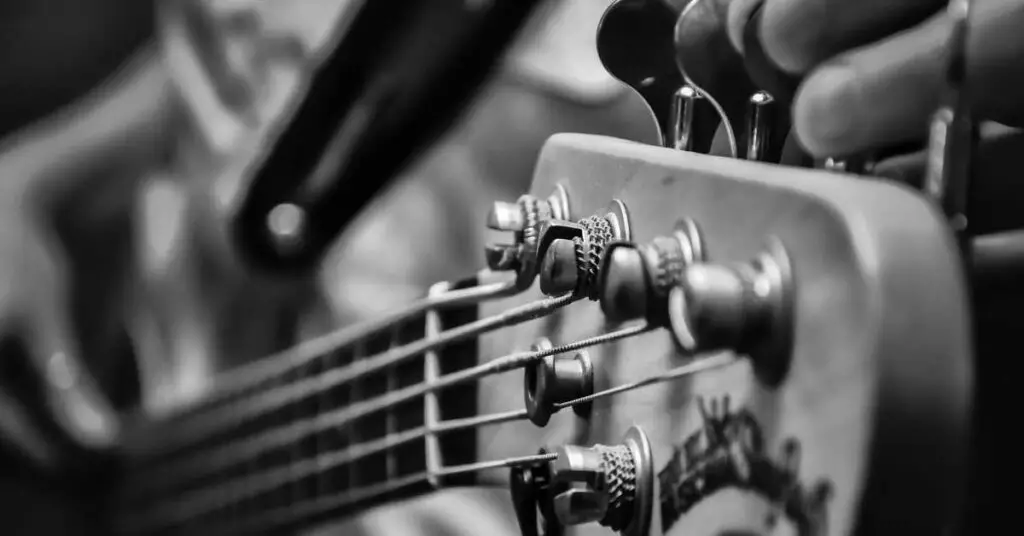One of my favorite things to do as a bassist is to play low and fast. Playing in a melodic death metal band was thus an amazing experience for me. During this time, there was a question I got asked on a regular basis. Given that you are providing the low end in a genre that already is heavy, do you need a 5 string bass for metal?
As a general rule, you do not need a 5-string bass to play metal and for most genres of metal, a 4-string is sufficient. In sub-genres that utilize deeper tunings, many bassists opt for a 5-string as it has more range and flexibility than the 4-string.
While a 5-string bass is not a necessity to play metal, it can however often be a better choice than a 4-string. The 5-string can be a great beginner instrument, and will for the most part make down-tuned songs easier to play. The downside is that it can feel cumbersome for younger players, and they tend to be more expensive than 4-string basses.
Therefore, I`ve written this article to showcase why some metal bassists play 5-strings and others don`t. This way, you will be able to make an informed choice on whether a 5-string is right for you as a metal bassist or not.
Is a 5-string bass better for metal?
A 5-string bass is not objectively better for metal than a 4-string, it is a stylistic choice.
4-string basses are normally tuned EADG, while 5-strings are tuned BEADG, which offers a deeper range. Thus, on the surface, a 5-string seems like a natural choice for genres like death metal, black metal, and progressive metal where instruments are typically tuned down.
However, many bassists that tune down to B, do in fact use 4-strings. Examples of this are:
- Sharlee DÀngelo of Arch Enemy
- Jon Miller of DevilDriver
- Peter Steele of Type o Negative
- Jeff Walker of Carcass
What is important to note is that these players all use basses and strings that are suited for the lower B tuning.
These bassists tune their basses BEAD (or similar). 4-string basses are commonly tuned 2 and a half steps higher than this tuning.
Tuning a typical 4-string bass this way might require you to tighten the truss rod on your bass in order to get less bow.
You also need a set of thicker bass strings. It is thus common to purchase a set of strings intended for a 5-string and not use the G string at all. You might also need to re-cut the nut on your bass.
Thus, it is often a preferable choice to purchase a 4-string that is designed to be played in BEAD. Ibanez, Squier, and Schecter are all great brands that produce more robust basses for this purpose.
Other bassists that play in B tuning just opt to play a 5 or 6-string instead. Some of these include:
- Hugh Mingay of Arcturus
- Tony Campos of Fear Factory
- John Myung of Dream Theater
- Jeroen van Veen of Within Temptation

What is the advantage of a 5 string bass in metal?
While the right 4-string will work for metal, the 5-string does hold some advantages over the 4-string.
- No need to tune down. Metal bands often tune their instruments down to various tunings, such as C# standard. Some songs will require a drop tuning, but in general, you can play most metal songs on a 5-string without tuning your instrument. This can make it easier to master and control your instrument than constantly having to tune a 4-string.
- More range. An extra string gives you more flexibility in your playing. As the deepest string is usually tuned similarly between 4 and 5 basses in metal, this means that the 5-string offers more high range. This is a big advantage if you are a melodic player or are looking to play solos. Notably, this is also a big reason some metal bassists opt for 6-strings in genres like progressive metal.
- Flexibility. Chances are that if you enjoy metal, you also enjoy many sub-genres of it. Even if a 4-string is enough at the moment, a 5-string could prove useful in future projects. Playing a 5-string without utilizing it fully does no harm and can save you from having to purchase a new bass if you get an offer to join a band that wants a 5-string player.
How much does a 5 string bass cost?
A brand new entry-level 5-string bass guitar will cost around $300 and up. Intermediate basses of higher quality tend to cost between $500 and $2500
If you are buying an entry-level bass, you can get a 4-string for ~$200, which is cheaper than a 5-string. A 6-string bass, on the other hand, will cost you a bit more and you can expect to pay $400-$500.
The table below is an indication of how much you need to spend on a quality 5-string in different ranges:
| Bass | Price range | Level | Main upside |
| Ibanez SR305EB | ~$400 | Beginner | Affordable entry-level bass, flexible and cost-effective choice |
| Yamaha TRBX 305 | ~$400 | Beginner | Very powerful tone considering the low cost of the bass |
| Schecter Stiletto Studio 5 | ~$900 | Intermediate | Designed specifically for metal, trustworthy brand |
| Ibanez SRMS 805 | ~$1000 | Intermediate | Versatile bass for all genres of metal, my #1 pick |
What type of 5-string bass is best for metal?
Ibanez and Schecter are both great brands for 5-string metal basses. They have a punchy and versatile sound and with a proper metal bass EQ, these instruments will sound heavy. . The Ibanez SR305EB is a great starter 5-string, while Ibanez SRMS805 and Schecter Stiletto Studio 5 are more suited for intermediate players.
Personally, I have always preferred Ibanez basses for metal, as I prefer the versatility in sound that they offer. If you are just starting out and want a 5-string the SR305EB is a great and affordable entry-level instrument.
For a quick demonstration of the different types of sound you can get with this bass, check out this video by Caney Boniface below:
Another great option is the SRMS805. This is a more costly option and I recommend it for intermediate players as it takes some knowledge to make use of its versatility. This is hands down the best bass for metal I have personally tried and due to its dynamic sound, it is suitable for all subgenres of metal.
Here is a demonstration of its sound:
Lastly, I wanted to showcase the Schecter Stiletto Studio 5. Schecter is made for metal, as you can see in their list of featured artists.
Metal guitarists love them, but Schecter also produces great basses. Watch the video below to see what the Stiletto Studio 5 is capable of:
Conclusion
You do not need a 5 string bass to play metal.
Still, a 5-string bass carries certain advantages over 4-strings and many successful metal bassists prefer playing 5-strings.
Some more complex and melodic metal genres can be difficult without a 5, or even a 6 string. A 5 or 6 string also offers more range, either in the high or low end, and gives you more flexibility when composing bass lines.
Some bassists also prefer the thicker neck and narrower space between strings on the 5-string and find it more comfortable to play. Whether this applies to you and your play style can only be found out by trying out a 5-string.
For most metal bassists, the choice between 4, 5, and 6 strings is thus mainly about preference, style, and comfort, rather than necessity.
If you are a beginner-level metal bassist, it can be hard to know how to improve efficiency. If I could go back in time, the one thing I would practice a whole lot more is scales. To learn more about why check out my guide on these Essential Metal Bass Scales.

